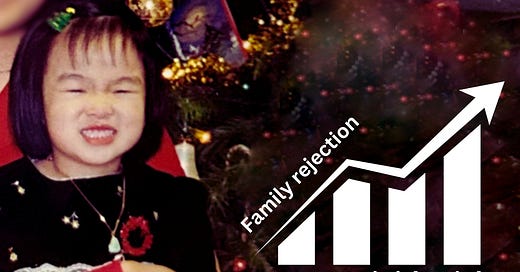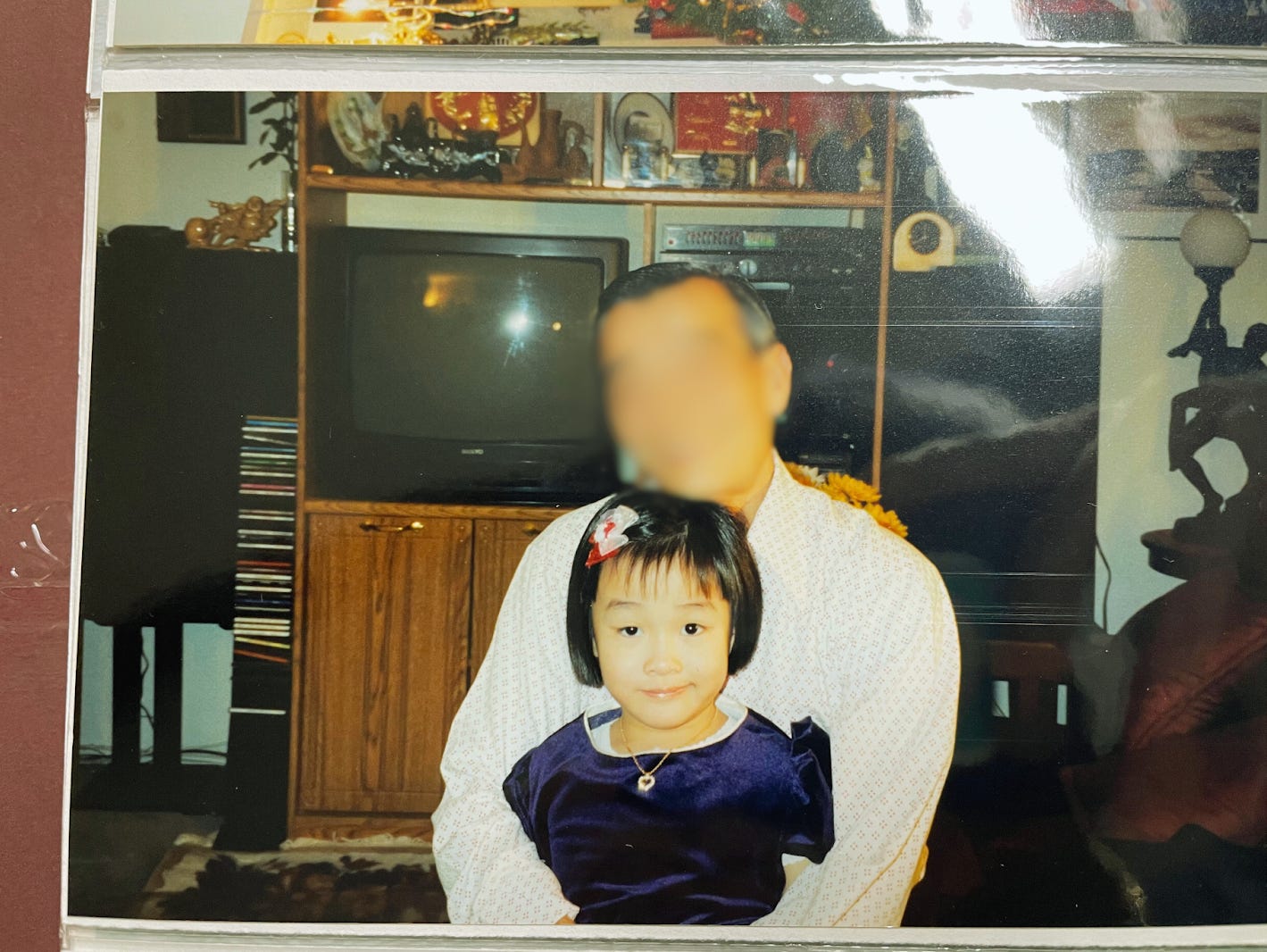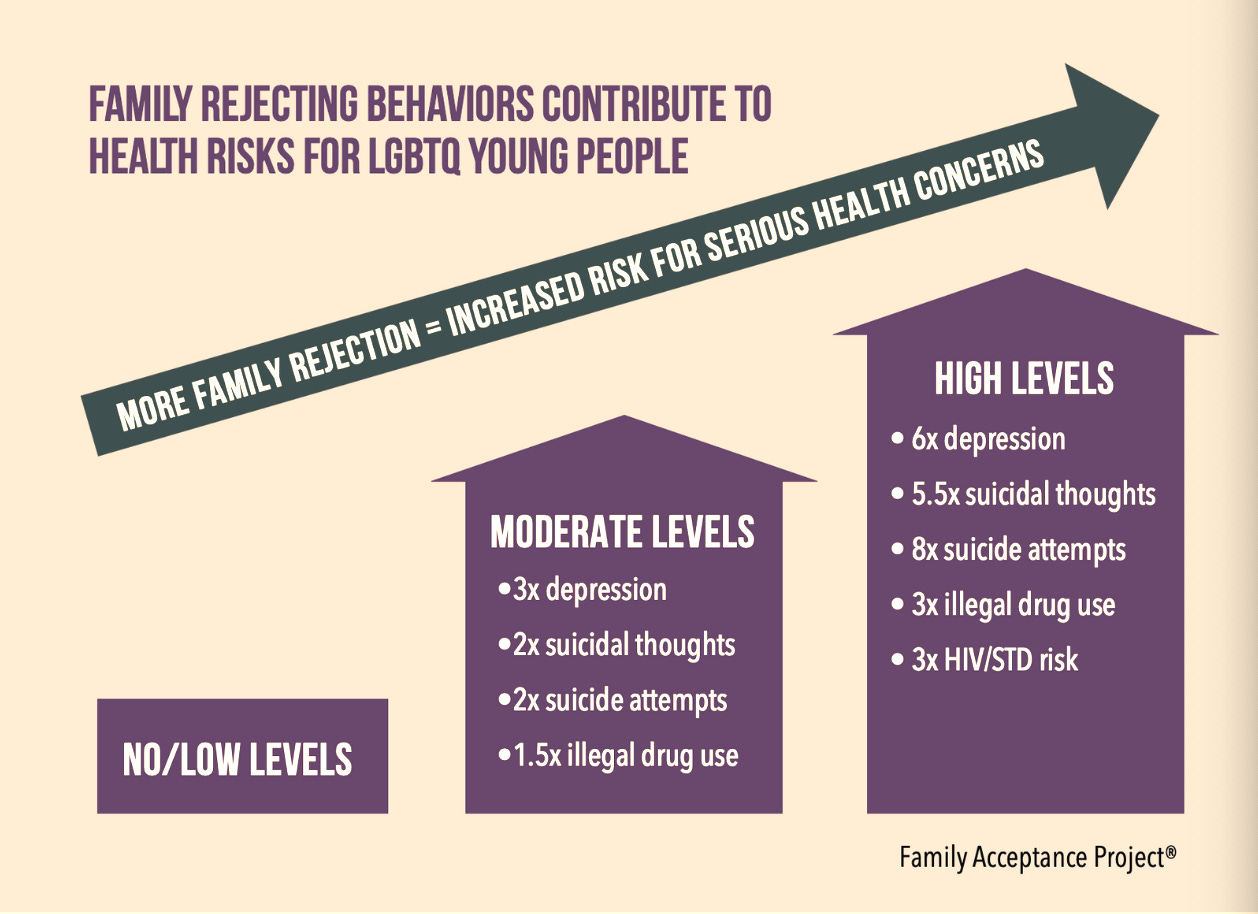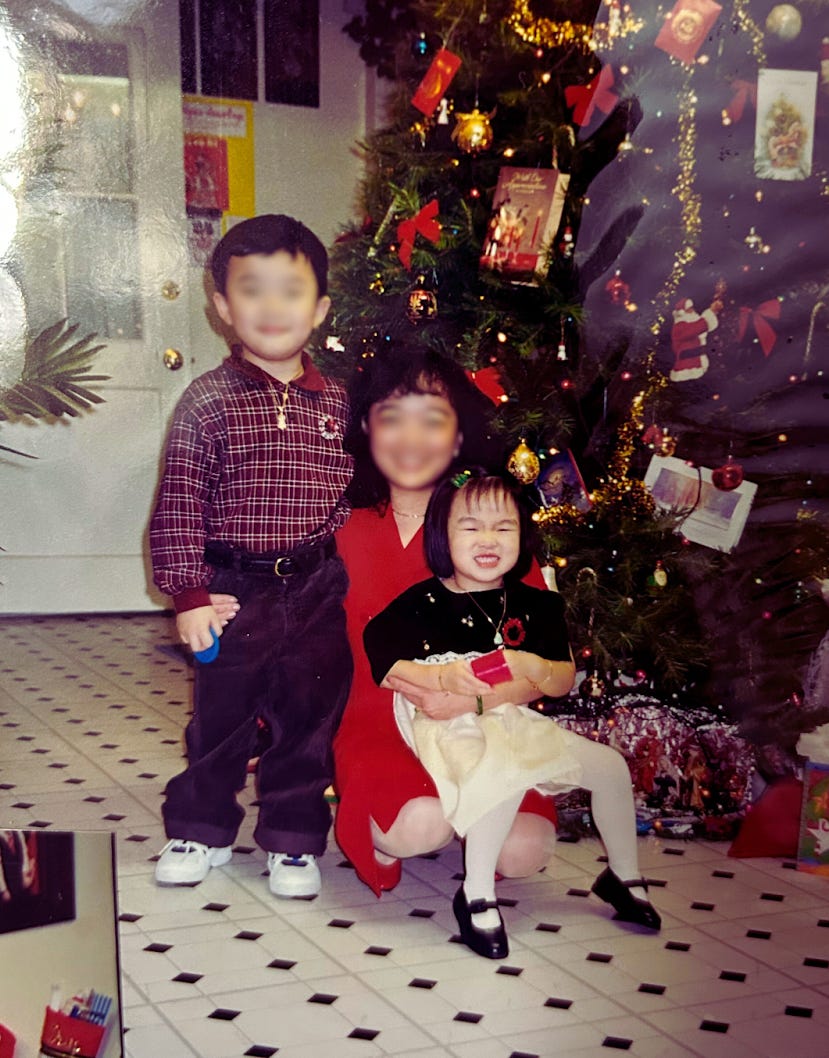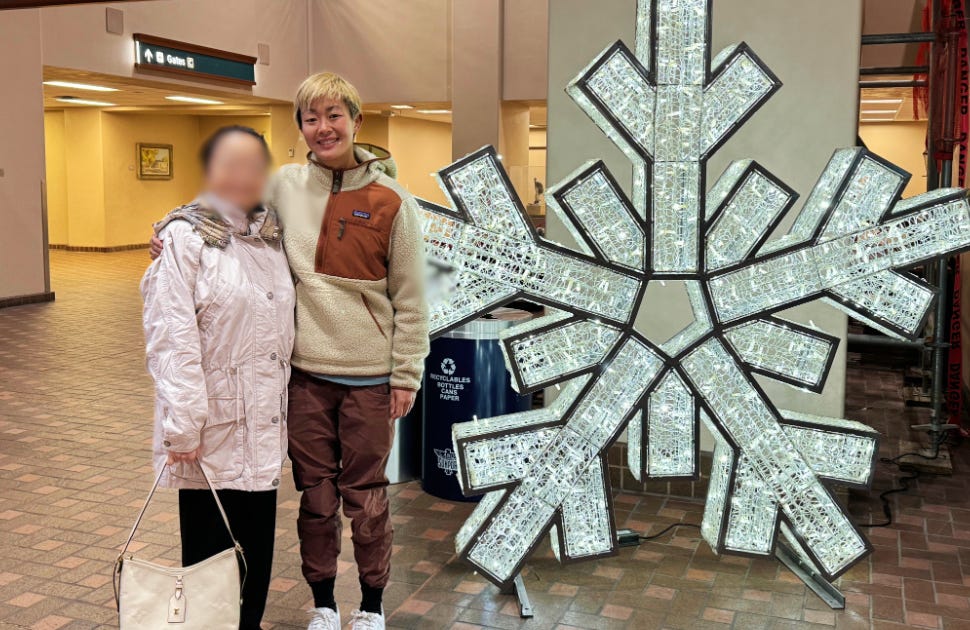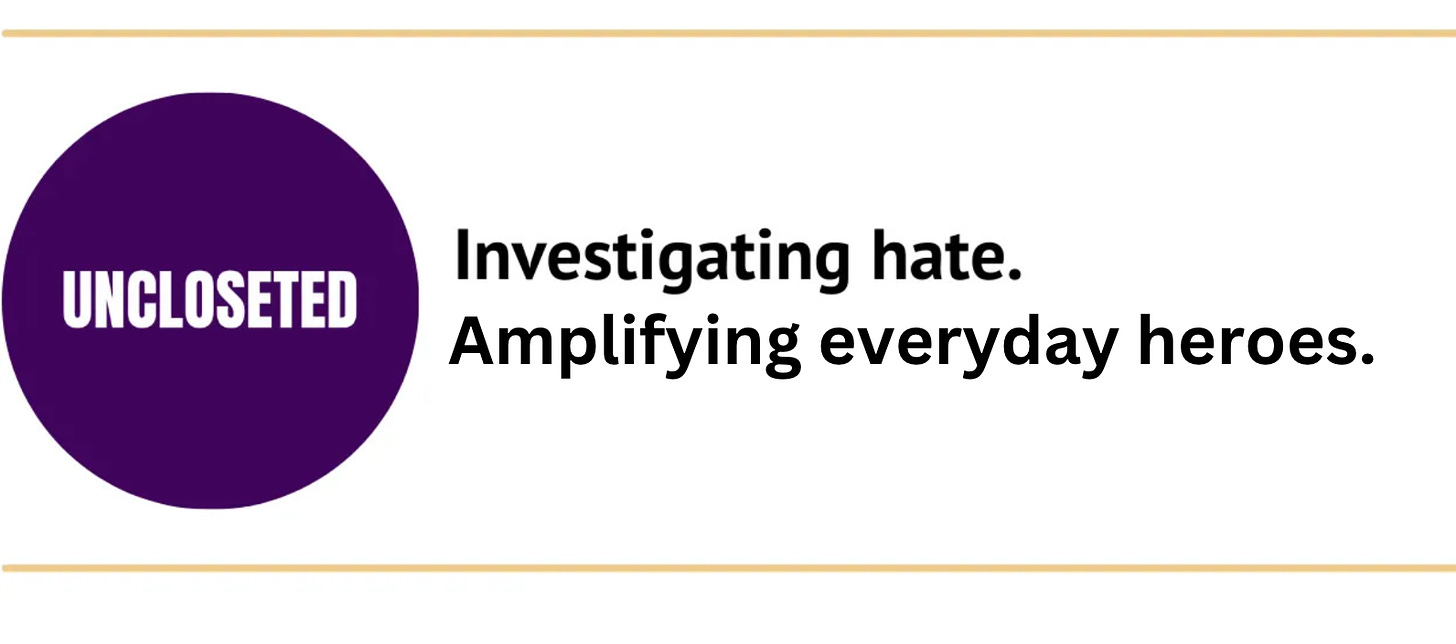'Eight Times the Suicide Risk': Family Rejection is a Public Health Crisis for LGBTQ Youth
Family support has been proven to be the leading way to cut suicide risk for LGBTQ individuals, but less than 40% of queer youth feel accepted at home. What are they doing this holiday season?
Editor’s note: This article includes mention of suicide and contains details about those who have attempted to take their own lives. If you are having thoughts of suicide, or are concerned that someone you know may be, resources are available here.
In 2020, U.P. Nguyen called her mom in Albuquerque, New Mexico, with a secret she had kept for 23 years.
“Mom, I’m gay.”
Her mom responded in Vietnamese, Nguyen’s native language.
“[She] said I was going to hell and that she wasn’t sure what they did to deserve a daughter like me,” Nguyen, a 26-year-old running coach and data engineer living in Boston and New York, told Uncloseted Media. “Just thinking about it makes me tear up.”
Before the end of the call, Nguyen’s mother told her she was “cut out of the will.”
Nguyen usually goes home to celebrate Christmas with her deeply religious parents, who have voted for President-elect Donald Trump three consecutive times, but she won’t return this year.
“I don't really want to spend the holidays moping by myself,” she told Uncloseted Media. “I'm heartbroken. I’ll miss a lot of things about being home. I’ll miss my siblings. But I feel like I need to not go.”
Nguyen’s parents did not respond to Uncloseted Media’s request for comment.
Nguyen’s experience highlights a broader issue many LGBTQ people face: the struggle for family acceptance during the holidays. In the U.S., less than 40% of LGBTQ youth consider their homes affirming and over a quarter report daily tensions.
Family rejection takes a significant mental health toll: LGBTQ people who experience high levels of rejection from their families are eight times more likely to attempt suicide.
The pervasive familial rejection of queer people is a public health crisis and the severity of it is often downplayed. “The lack of support from the family is contributing to despair, lack of hope, thoughts of taking their lives, substance abuse, and various other kinds of risks,” says Caitlin Ryan, director of the Family Acceptance Project, a research and education initiative aimed at spreading awareness for LGBTQ family acceptance and mental health.
Ryan, who co-founded the project in 2002, says that until her organization started this research, “no one knew that there were a whole set of behaviors that were related to family acceptance and mental health [for LGBTQ people].” And even today, research is limited.
For Nguyen, her parents’ rejection often makes her feel angry. “I’m pissed off,” she says. “A lot of my friends have it simpler.”
She says this rejection manifests in the everyday interactions that others take for granted. “I was FaceTiming my mom and I was trying to show her that I was at my girlfriend's house … I handed the phone over to her, and then my mom immediately hung up. It felt awful.”
While many LGBTQ folks feel this rejection daily, the holidays often amplify feelings of loneliness for those estranged from their families. Sixty-six percent of people report feeling lonely during the holidays, and 64% of individuals with mental health conditions say the season worsens their state, according to the National Alliance on Mental Illness.
“LGBTQ people throughout time have lived in a world that wasn't supportive, that often discriminated against them and was rejecting and victimizing. And so support is essential,” says Ryan.
Robin, who grew up in Southern California, says their upbringing was full of rejection because of their father’s treatment of them, their past partners and the LGBTQ community at large.
“The expectation has generally been that for the holiday seasons, everyone who has moved away from our hometown will come back and spend a few days there,” says Robin, 26, who moved to northern California and asked to use a pseudonym out of a “fear of blowback” from their dad. “I've done that once in the past five years and was very reluctant to do so.”
Robin, who is not going home this holiday, says that their father was harsh towards their transgender partner when they both visited him.
“My dad took that opportunity to interrogate her about her identity and ask what kind of hormones she was on and what kind of surgeries she had gotten,” they told Uncloseted Media. “He does not use my correct name unless I specifically insist, which I have to do every sentence. I have not heard him gender me correctly once.”
According to Ryan, the tactics used by Robin’s father contribute to mental health deterioration. “Rejection behaviors all focus on trying to change, prevent, deny or minimize someone's LGBTQ identity,” Ryan says. “That includes behaviors like blaming your child when others mistreat them because of their LGBTQ identity, not talking about their identity, pressuring them to be more or less masculine or feminine, not using their appropriate name, misgendering them, and so on.”
Research has found that when trans youth could have their chosen name used, there was a more than 70% decrease in severe depressive symptoms and a 65% decrease in suicide attempts. “This is startling when you think that this is just about using someone's name,” says Ryan.
“I want to be speaking up against these things, and I often do. And my impression is that that disturbs the peace of the holidays,” Robin says. “There is this unspoken agreement that we will tolerate it, but I am no longer afraid of ruining a relationship by bringing these things up because I see that relationship as being over already.”
Since Nguyen came out four years ago, she says going home for the holidays is difficult. “I’m gay, I’m the only one who moved away from home, and so I’m definitely the topic of gossip when I visit,” she says. “It’s often like, ‘Whoa.’ I feel pretty scrutinized.”
What Robin and Nguyen are describing is the conflict that many LGBTQ children feel towards their parents: the pull to be themselves authentically, clashing with a desire to keep relationships with their parents intact, with silence as the glue.
“When we're in environments where we don't feel like ourselves, it creates a sense of avoidance,” says Rebecca Schlegal, professor of psychology at Texas University, whose research focuses on authenticity and well-being. “But when you're talking about family, what a conflict, right? Our impulse is going to be to approach family. But when you're getting signals that you don't fit, you're going to feel like you need to avoid. And so that's going to arouse a sense of conflict within the self.”
According to Schlegel’s research, when people are allowed to be themselves and feel accepted, their well-being skyrockets. “Authenticity is associated with every mental health outcome that we've ever looked at. It's bigger than a typical effect that we see in social psychology,” she says.
For Nguyen, the rejection manifests in acute mental health struggles. “It feels like deep sadness,” she says. “Like, ‘Man, Why is this happening to me? Why can’t good things happen to me?’ And I feel lethargic and it’s hard for me to move, like literally move and get off the couch or out of bed.”
She says the worst experience was in 2022, shortly after she and her girlfriend broke up and she chose to go home to her family for Christmas. “My ex had hosted me for the holidays for the [three] years we were dating and I didn’t have to go back home. I was like, ‘Wow, this is really nice. Like, this is what it's like to have a family that is supportive.’ So the double gut punch of losing my [girlfriend] and then needing to deal with all the homophobia and toughness of home was terrible for my mental health.”
In an advisory released last year by U.S. Surgeon General Dr. Vivek Murthy, isolation and loneliness are as bad for your health as smoking every day. It can also increase your risk of mental health conditions, stroke, heart disease and even premature death.
“There’s often a perception that people are always the answer to not feeling alone. [But] sometimes they're the cause,” Sam Carr, loneliness researcher at the University of Bath, told Uncloseted Media.
“If you have to be somebody else with your family, that means the real you is hidden. So even when you do go back home, you feel lonely because your family requires you to be something different. If you live your whole life that way, you've essentially lived a very lonely existence. The world hasn't seen you.”
“Somewhere in between my high school self and now I've tasted freedom and what it’s like to be fully myself, fully out, fully existing,” Nguyen says. “When I'm at home, I feel like I have to put on a mask or I have to censor myself because my parents and I have very differing opinions, and I don’t want to spend the whole time I visit fighting, so I just don't say a lot of things. Even though I’m out, it feels very closeted.”
Research has found that more than a quarter of Americans are estranged from family members and that differences over political views are among the leading causes of those estrangements.
“Many queer people are profoundly distressed and even feel betrayed by their family members this election,” says Linda Hsieh, a life coach and psychotherapist who works with LGBTQ clients. “Individuals may be thinking, ‘How could you not vote to support me? I'm part of the family.’”
Mary, a 26-year-old trans woman originally from Hawaii who wished to remain anonymous to not further fracture her relationship with her parents, spent this Thanksgiving at home in Oregon with her conservative evangelical family.
“I don't want to go back any time soon,” she says. “My father is a Trump supporter, and we've had lots of fights about it.”
Mary knew she was trans from the age of 12 but kept it to herself for over a decade before coming out to her family in 2022. Since then, her family avoids addressing her name and tries to act as though “nothing happened and nothing changed.”
Her aunt has refused to let her see her niece and nephew, citing concerns about confusing the children because of her identity. “I don’t think it’s right to treat my identity as another potential source of conflict. I miss them deeply.”
During Thanksgiving dinner, it was tense. “My grandparents wouldn't look at me, and they would talk around my name so they didn’t have to say it,” she says. When politics came up, she felt outnumbered. “I felt like I couldn't speak.”
Mary says it has impacted her mental health. “Whenever I visit Oregon, I feel an old depression set back in and it makes me antsy to return home to Los Angeles where I don't often feel that same caged animal sadness.”
Nguyen, who is the first-born daughter of her Vietnamese refugee family, says that she understands where her parents are coming from, but she disagrees. “They think that I'm going into battle because they are very religious, and it was tough to be queer in their world growing up. But I think they don't quite understand that it's different now.”
Research published in the American Journal of Preventive Medicine insists that there must be a change. The study reveals a powerful intervention to suicide prevention among LGBTQ people: love. According to the longitudinal study on suicide ideation, social support from family and friends is the most protective factor for at-risk youth.
“We found that when there were high levels of these supportive behaviors, there were extremely low levels of suicidality, depression, substance abuse, very high levels of self-esteem, high levels of overall health and well-being, positive social connections, and having people who care about you and support you overall,” Ryan says.
She emphasizes that solutions to family rejection don’t require parents to abandon their religious beliefs or political values but instead focus on practical behavioral changes. “They just need to modify their behaviors in ways that show love.”
Ryan's approach involves guiding families through small, actionable steps, such as using their child’s chosen name and pronouns. She also encourages families to take part in educational programs that explain the impact of rejecting behaviors.
“It’s about meeting the family where they are at,” says Ryan. “Most of these families want their kids to be happy and healthy. When they see the data about how much pain the rejection is causing them, they change. They want to keep their families together.”
This holiday, Nyguyen is feeling conflicted about not going home. “Sometimes I get lonely,” she says. “I’ve been quite lucky to have had an incredible support network around me. When I came out and was rejected by my parents, I was immediately embraced by other loved ones. I had a stable tech job and a roof over my head, far from family, so the damage was mostly limited to feeling cast out by the ones who were supposed to love me the most.”
Nguyen has been in therapy for years and says that it has done “wonders” for how she processes her familial relationships. “They’re not the easiest, but they’re mine, and I get to choose whether or not I want them. I will always love my family and want to honor what they gave me, and I'm still deciding how to do that in a way that doesn't make me go crazy.”
If you or someone you know is struggling with suicidal thoughts or mental health, call or text 988 to reach the Suicide and Crisis Hotline. Other support hotlines.
If objective, nonpartisan, rigorous, LGBTQ-focused journalism is important to you, please consider making a tax-deductible donation through our fiscal sponsor, Resource Impact, by clicking this button:


